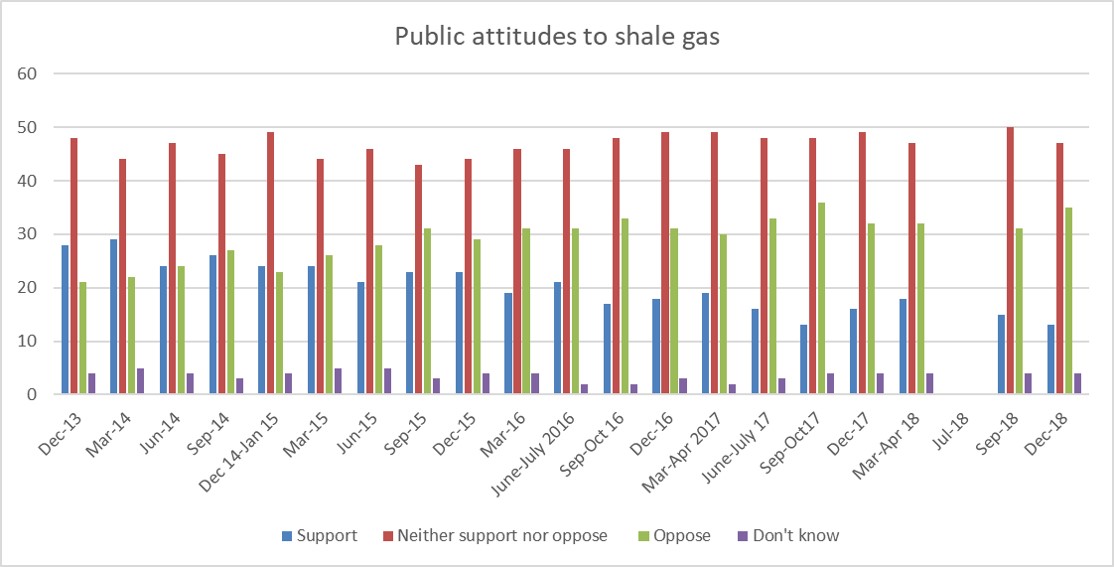
Opposition to fracking has risen to near record levels in the latest government public attitudes survey with a big increase in concern about earthquakes. Support for fracking fell to a joint record low.
The Wave tracker survey, conducted in December 2018, was the first to reflect reaction to fracking at Cuadrilla’s shale gas site at Preston New Road. By the end of the survey period, operations at the site near Blackpool had induced 57 seismic events.
A government-commissioned report, which likened some of the tremors to a bag of flour dropping on the floor and predated the survey, appears not to have reassured participants.
Yesterday, Cuadrilla called for a review of the rules on fracking induced-earthquakes, arguing that it may not be commercially-viable to extract shale gas from Preston New Road within the current limits.
The latest survey, published this morning, also bucked the trend of previous years, which saw a rise in support for fracking and fall in opposition in the winter.
Opposition
According to the latest results, 35% of participants opposed fracking, up from 31% in September 2018. This is the highest level since the record of 36% in September 2017.
Strong opposition was 13%, up one percentage point on the previous survey but down from 16% on the results from a year before.
Who opposes fracking?
As in previous surveys, the more people said they knew about fracking the more likely they were to oppose it. In the latest survey, of those who claimed to know a lot about fracking, 66% opposed and 20% supported it.
People most likely to oppose fracking included participants in social grade AB (42% compared with 27% in social grade DE), home owners (39% compared with 29%/25% for private/social renders), people living in Scotland (50%), Wales (45%), and the north west (41%) and south west (40%) of England.
Why do people oppose fracking?
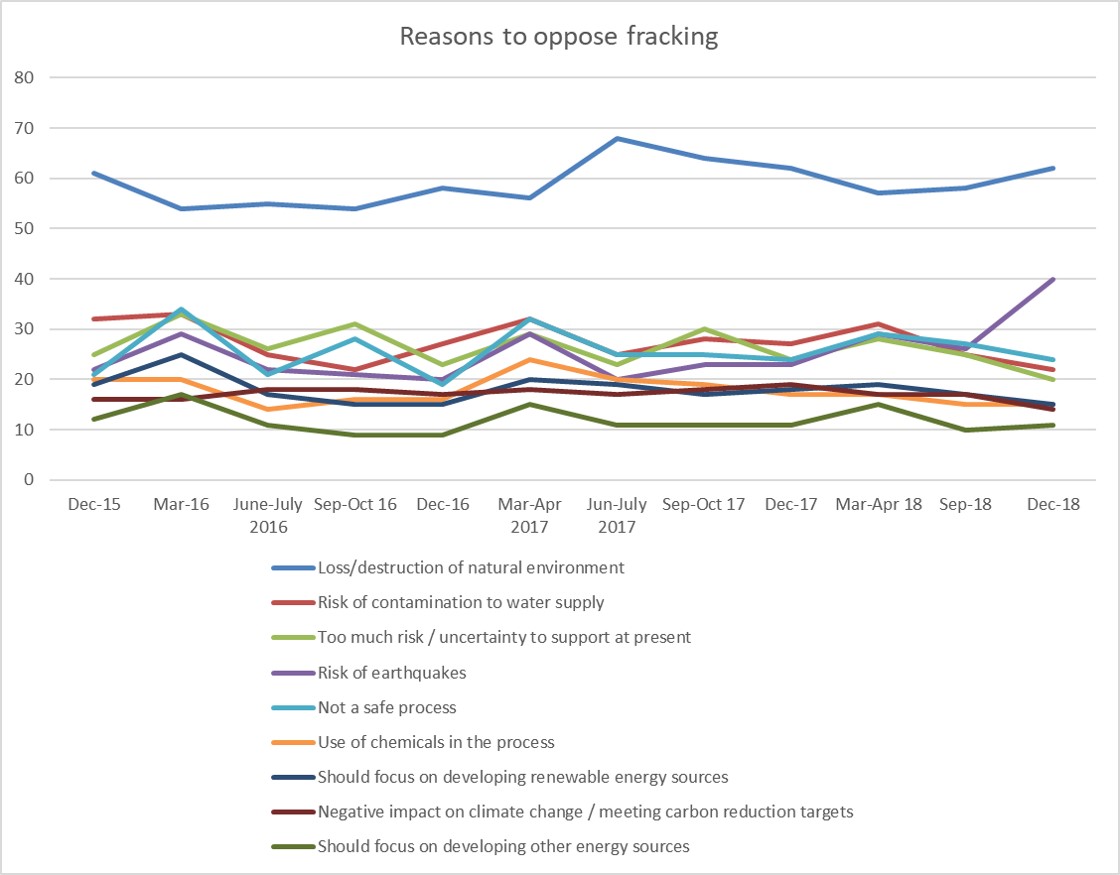
The main reasons why people opposed fracking were:
- Loss or destruction of natural environment (62%, up from 58%)
- Risk of earthquakes (40%, up from 26%)
- Risk of contamination to water supply (22%, down from 25%)
- Too much risk/uncertainty (20%, down from 25%)
- Not a safe process (24%, down from 27%)
- Use of chemicals (unchanged at 15%)
Support
Total support for fracking fell to 13%. This is the lowest level recorded in the survey so far, also reached in September 2017.
The latest figure was down from 15% in the previous survey in September 2018 and 16% for the same time a year before.
Strong support for fracking remained unchanged at 2%.
The gap between support and opposition has increased again. It is now one percentage point short of the record in September 2017.
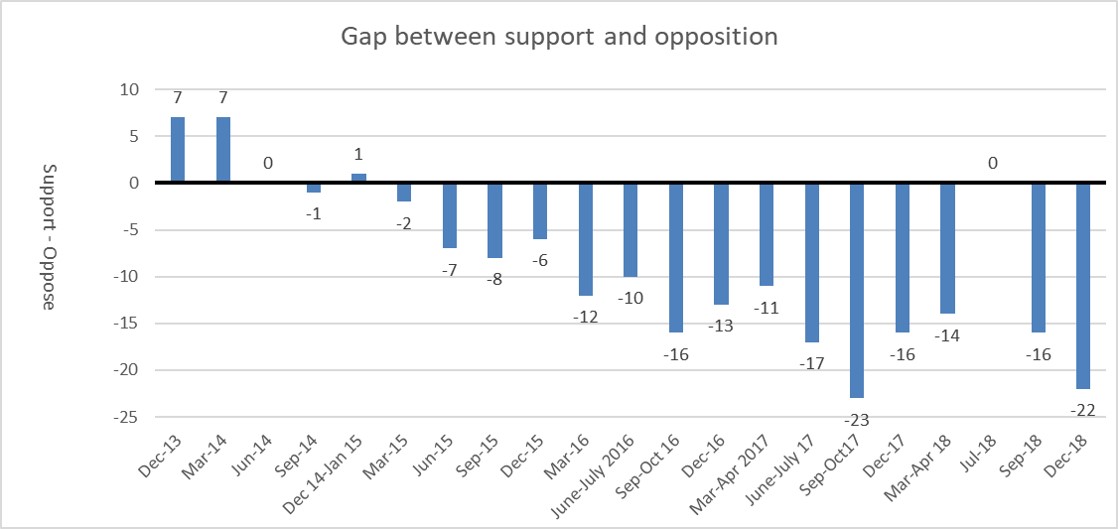
Who supports fracking?
According to the data, men were more likely to support fracking than women (18% compared with 9%). People aged 65 and over were also more likely to support (18% compared with 7% for 35-44 year olds).
Why do people support fracking?
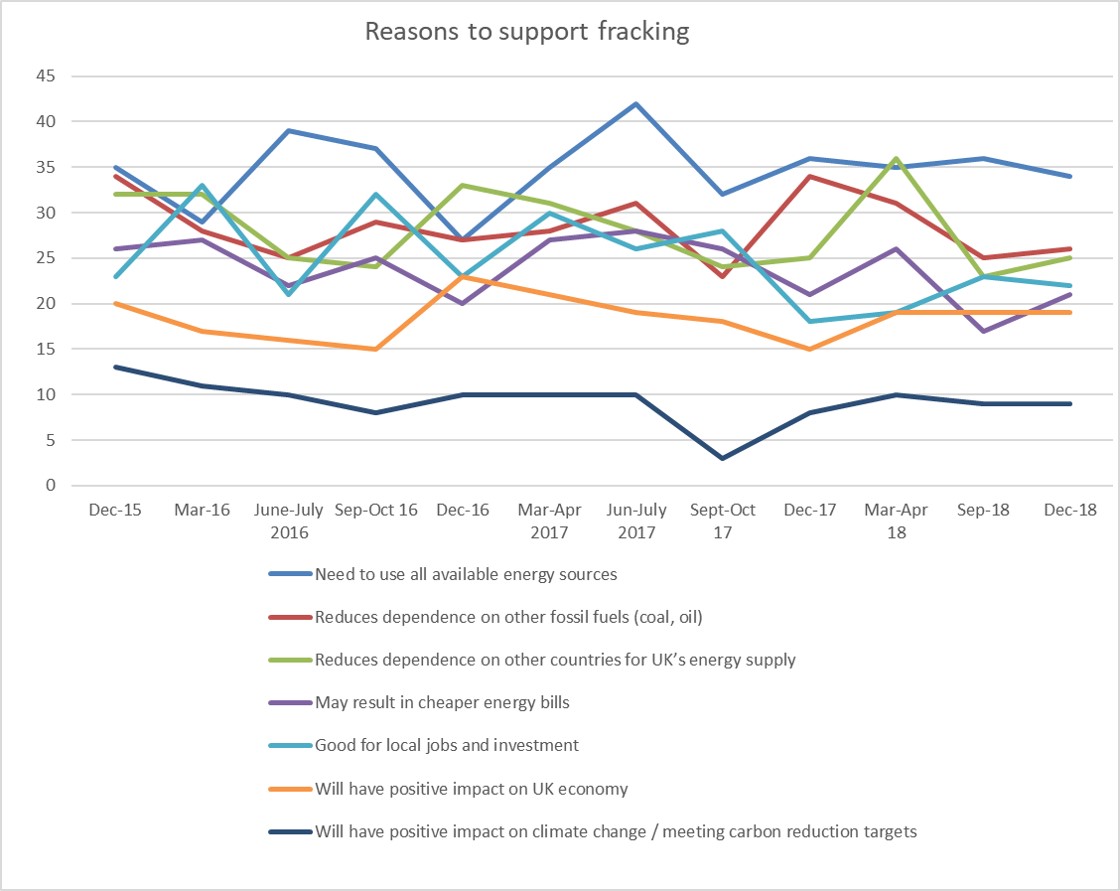
The main reasons people gave for supporting fracking were:
- Need to use all available energy sources (34%, down from 34%)
- Reduces dependence on other fossil fuels (26%, up from 25%)
- Reduces dependence on other countries for UK energy (26%, up from 25%)
- May result in cheaper energy bills (21%, up from 17%)
- Positive impact on the UK economy (static at 19%)
Neither support nor oppose
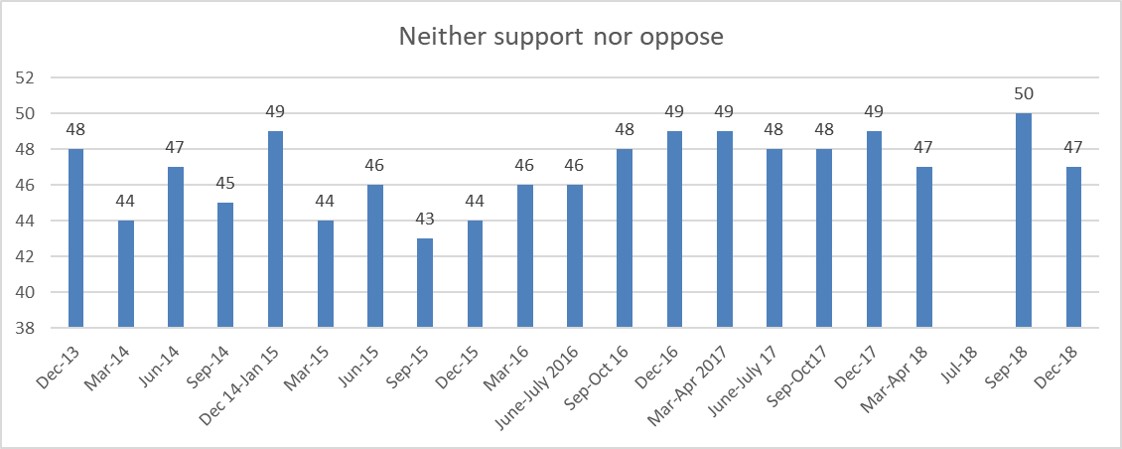
47% of participants neither supported nor opposed fracking. This was back down to a level in March 2018, following an increase to 50% in the previous survey. The main reason given was “don’t know enough about it”.
4% said they did not know whether they supported or opposed, unchanged on the previous survey.
Awareness
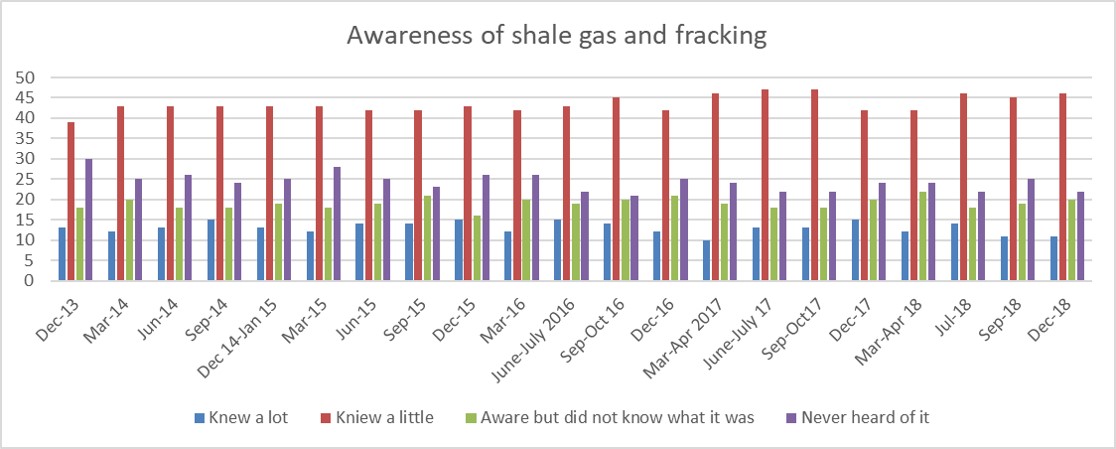
78% of participants were aware of fracking for shale gas. This is the same level as in July 2018 and up slightly from the previous survey.
11% said they knew a lot about fracking (unchanged from the previous survey). 46% said they knew a little and 20% were aware. 22% said they had never heard of fracking, down from 25% in the previous survey.
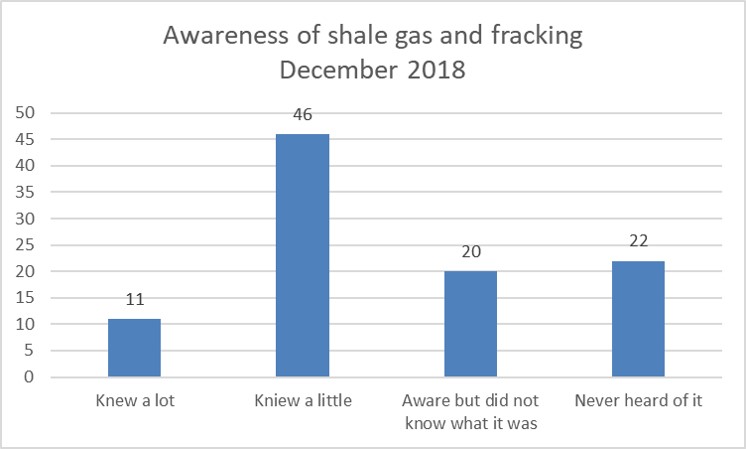
According to the findings, awareness of fracking was higher among participants aged 65 and over (89%, compared with 59% of 16 to 24 year olds), those in social grade AB (90%, compared with 66% in social grade DE), those with household incomes of £50,000 and over (88%, compared with 74% with household incomes under £16,000) and those living in Northern Ireland and the North West (88% and 87% respectively, compared with 59% of those living in London).
Reaction
Daniel Carey-Dawes, Infrastructure Policy Manager at the Campaign to Protect Rural England, said:
“The Government has today met its obligation to protect our environment and the public, by refusing to entertain the desperate calls by industry for a relaxation of regulations on seismic activity as a result of fracking.
“It must now take this damning evidence that fracking does not have the support of the public into consideration as it makes its decision on proposals to fast-track fracking. Perusing this plan would defy local democracy and remove the voices of local communities in decisions over fracking proposals in their area.”
A spokesperson for Frack Free Lancashire said:
“The increased opposition to fracking and drop in support comes as no surprise, considering the large number of seismic events which have been experienced since fracking resumed on the Fylde Coast. Fracking’s unpopularity will also have been increased by people’s distaste for the fracking companies’ bully boy tactics as they have tried to browbeat government into changing the regulations governing the seismic traffic light system.”
Steve Mason from Frack Free United said:
“How can shareholders or any sensible business keep on backing fracking? To continue forging ahead is beginning to look fanatical and totally irresponsible. Fracking is proving to be economically unviable, the industry cannot operate safely under the very same regulations they helped create.
“Fracking threatens industrial wipeout of some of the UK’s most valuable countryside and has no public support. It’s time for a change of direction. Fracking in our communities is never going to be a strategic winner for this country.”
Methodology
The fieldwork was carried out for the Department of Business, Energy and Industrial Strategy from 5-16 December 2018 using the Kantar TNS Omnibus. The results of the Wave 28 tracker were based on face-to-face home interviews with a representative sample of 4,273 households in the UK.
- The survey dropped a question on attitudes to fracking in July 2018 but reinstated it in September 2018.
Categories: Research





Subway train cause seismic underground and under the building every day. So it is a vit unfair restrictions to shale.
We call it the underground over here BTW, and that is only in London, where they wont frack because it will upset the pro fracking constituents.
Maybe you live near one of these?
NYC Subway – 468km long
Shangai Metro – 337km long
Bejing Subway – 319km long
Seoul* Subway – 311km long
Paris Metro – 303km long
Madrid Metro – 301km long
London Underground – 270km long
Moscow Metro – 196km long
Mexico City Metro – 195km long
Tokyo Metro – 179km long
Have a nice subway away day.
fracking is increasingly the domain of those with no sense of our history. France that bans fracking then comes here ?? This land is ours not some foreign company squealing for the right to break up our our land and disturb this beautiful island ! No back handers or giving them licence to create risk to our homes any more !
Geoscientists are calling to support Ineos and Cuadrilla plea for seismic limit review.
https://www.independent.co.uk/environment/fracking-earthquakes-scientists-limits-cuadrilla-shale-gas-fossil-fuels-climate-change-a8771641.html
A group of almost 50 (or is that 49?) Subway Surfers perhaps?
So it misses the arbituary cut-off bench mark, eh? Lol.
49 on the Richter Scale? The only cut off from that would be when the shattered remains of the Earth fell into the sun…..not so Lol?
Might upset the solar subway too…..